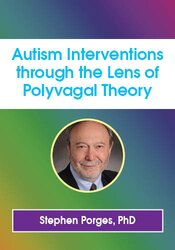
Trending Topics:
×

Join Dr. Stephen Porges, the developer of Polyvagal theory (PVT)—also known as the neuroscience of safety—as he guides you through a perspective to understand the atypical social behavior, defensiveness, stress responses, and mental health comorbidities of many individuals on the spectrum. Through the PVT lens, you’ll learn how:
Through research and an understanding of the science, this workshop provides a more compassionate understanding of the severe social and emotional dysregulation of autistic individuals and a more optimistic narrative of minimizing these disruptive behaviors.
All members of the PESI, Inc. planning committee have provided disclosures of financial relationships with ineligible organizations and any relevant non-financial relationships prior to planning content for this activity. None of the committee members had relevant financial relationships with ineligible companies or other potentially biasing relationships to disclose to learners. For speaker disclosures, please see the faculty biography.
NOTE: Tuition includes one free CE Certificate (participant will be able to print the certificate of completion after passing the online post-test (80% passing score) and completing the evaluation). Instructional methods will include PowerPoint, didactic lecture, and others.
Continuing Education Information: Listed below are the continuing education credit(s) currently available for this non-interactive self-study package. Program content is reviewed periodically per accrediting board rules for currency and appropriateness for credit. Credit approvals are subject to change. Please note, your licensing board dictates whether self-study is an acceptable form of continuing education, as well as which credit types are acceptable for continuing education hours. Please refer to your licensing board's rules and regulations. If your profession is not listed, please contact your licensing board to determine your continuing education requirements and check for reciprocal approval.
For other credit inquiries not specified below, please contact info@pesi.com or 800-844-8260 before purchase.
Materials that are included in this course may include interventions and modalities that are beyond the authorized practice of your profession. As a licensed professional, you are responsible for reviewing the scope of practice, including activities that are defined in law as beyond the boundaries of practice in accordance with and in compliance with your profession's standards.
For Planning Committee disclosures, please see the statement above. For speaker disclosures, please see the faculty biography.
Earn up to 1.5 CE hours. Please see below, for more details, as credit amounts vary by jurisdiction and profession.
PESI, Inc. is approved by the Canadian Psychological Association to offer continuing education for psychologists. PESI, Inc. maintains responsibility for the program. This program is approved for 1.5 self-study continuing education hours. Full credit statement at: www.pesi.com/cpa-statement
This self-study activity qualifies for 1.5 continuing education clock hours as required by many national and local licensing boards and professional organizations. Save your activity advertisement and certificate of completion, and contact your own board or organization for specific requirements.
| File type | File name | Number of pages | |
|---|---|---|---|
| Manual - Autism Interventions (4.7 MB) | 58 Pages | Available after Purchase | |
| Transcript - Autism Interventions Through the Lens of Polyvagal Theory (103.7 KB) | 19 Pages | Available after Purchase | |
| Manual - Autism Interventions - French (4.7 MB) | 58 Pages | Available after Purchase | |
| Manual - Autism Interventions - Italian (4.7 MB) | 58 Pages | Available after Purchase | |
| Manual - Autism Interventions - German (4.7 MB) | 58 Pages | Available after Purchase | |
| Manual - Autism Interventions - Spanish (4.7 MB) | 58 Pages | Available after Purchase |

Stephen W. Porges, PhD, is a distinguished University Scientist at Indiana University, where he is the founding director of the Traumatic Stress Research Consortium within the Kinsey Institute. He holds the position of Professor of Psychiatry at the University of North Carolina and Professor Emeritus at the University of Illinois at Chicago and the University of Maryland, and is a founder of the Polyvagal Institute. Dr. Porges served as president of both the Society for Psychophysiological Research and the Federation of Associations in Behavioral & Brain Sciences and is a former recipient of a National Institute of Mental Health Research Scientist Development Award. He has published approximately 400 peer-reviewed scientific papers across several disciplines including anesthesiology, biomedical engineering, critical care medicine, ergonomics, exercise physiology, gerontology, neurology, neuroscience, obstetrics, pediatrics, psychiatry, psychology, psychometrics, space medicine, and substance abuse. His research has been cited in more than 50,000 peer-review publications. In 1994, Dr. Porges proposed the Polyvagal Theory, a theory that links the evolution of the mammalian autonomic nervous system to social behavior and emphasizes the importance of physiological state in the expression of behavioral problems and psychiatric disorders. The theory is leading to innovative treatments based on insights into the mechanisms mediating symptoms observed in several behavioral, psychiatric, and physical disorders.
He is the author of The Polyvagal Theory: Neurophysiological foundations of Emotions, Attachment, Communication, and Self-Regulation (Norton, 2011), The Pocket Guide to the Polyvagal Theory: The Transformative Power of Feeling Safe (Norton, 2017), Polyvagal Safety (Norton, 2021), co-author with Seth Porges of Our Body Polyvagal World (Norton, 2023), and co-editor with Deb Dana of Clinical Applications of the Polyvagal Theory: The Emergence of Polyvagal-Informed Therapies (Norton, 2018). Dr. Porges is also the creator of a music-based intervention, the Safe and Sound Protocol™, which currently is used by approximately 3,000 therapists to improve spontaneous social engagement, to reduce hearing sensitivities, and to improve language processing, state regulation, and spontaneous social engagement.
Speaker Disclosures:
Access never expires for this product.
For a more detailed outline that includes times or durations of time, if needed, please contact cepesi@pesi.com. ** no”Access to Self Study” tab available.
Visit our FAQ page at https://www.pesicanada.ca/faq or contact us at https://www.pesicanada.ca/contact-us.
Satisfaction Guarantee
Your satisfaction is our goal and our guarantee. Concerns should be addressed to info@pesicanada.com.
Please wait ...